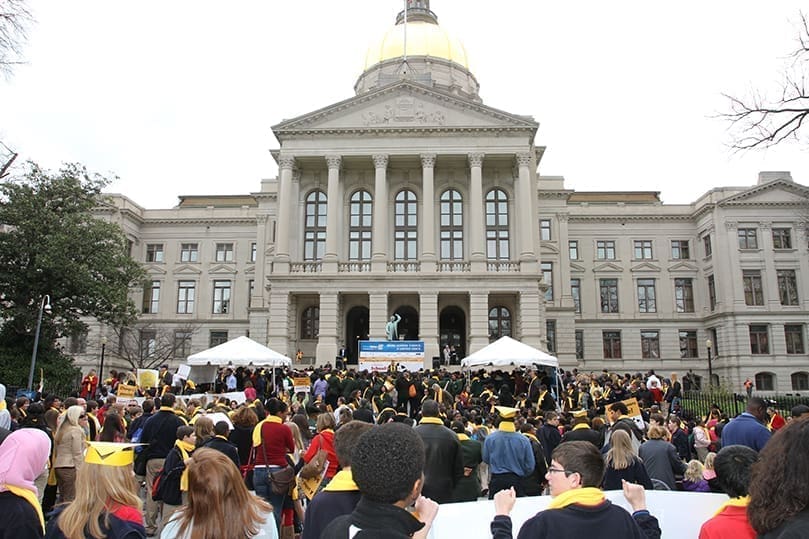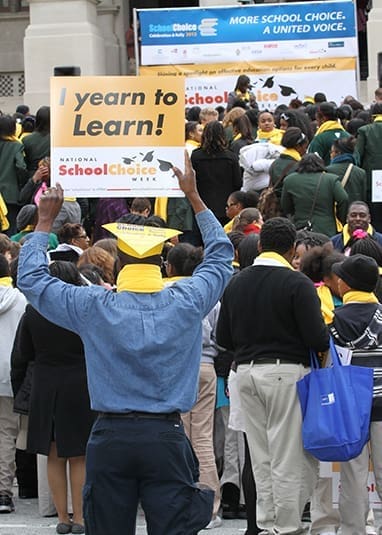 Photo By Michael Alexander
Photo By Michael AlexanderAtlanta
Tax Credits Let More Families Select Catholic Schools
By ANDREW NELSON, Staff Writer | Published February 2, 2012
Students, parents and teachers crowded the Statehouse rally Wednesday, Jan. 25, in support of school choice. People streamed into the legislature after the rally to tell lawmakers personal stories of what school choice has meant for them.
The Archdiocese of Atlanta was among about a dozen organizations backing the School Choice Celebration and Rally, which marked National School Choice Week.
As a sign of its growing popularity, one of the state’s biggest programs encouraging school choice, the Georgia Private School Tax Credit Scholarship Program, reached its annual cap of $50 million by November last year.
Some 421 students across the state have been awarded the scholarships to attend Catholic schools through this tax credit program.
However, GRACE Scholars, the student scholarship organization (SSO) of the Atlanta Archdiocese and Savannah Diocese, faced a setback as hundreds of its donors’ applications were turned down by the state because the maximum was reached before their paperwork was received.
This is the first time since the program was established in 2008 that the $50 million cap was reached. GRACE Scholars is one of 37 state-approved nonprofit SSOs whose supporters apply for the tax credits each year and give a corresponding donation to the SSO of their choice.
The rally comes after the Georgia Supreme Court handed the school choice movement an unfavorable ruling last spring. It ruled charter schools could not circumvent a local school board by appealing to a state board to get authorization to open a school.
School choice has long been a priority for the Georgia Catholic Conference, the public policy arm of the Atlanta Archdiocese and the Diocese of Savannah.
Dr. Diane Starkovich, the superintendent of Atlanta archdiocesan Catholic schools, said the church believes parents should be the primary educators of children, including having a choice where they attend school.
“We’ve been here every year,” she said.
“We believe parents are the first and most important educators so they (should) be allowed to choose. The Catholic Church calls it the primacy of the family. We believe they should choose,” she said.
Frank Mulcahy, the director of the Georgia Catholic Conference, said Georgia legislators are focused on a proposed constitutional amendment dealing with charter schools, which are a type of public school. The amendment would not affect Catholic schools, he said.
There are no new initiatives on school choice other than tweaking the current tax credit scholarship legislation to make payments more efficient, he said.
At the rally, speakers told the large crowd about the importance of school choice. Rally-goers wore yellow scarves and some had stickers saying, “Charters Schools Rock.”
Marian Baker, a student at Blessed Trinity High School, Roswell, was the only student speaker at the podium.
“I feel blessed to attend such a great school that is so attuned to my goals and my abilities. My parents recognized these strengths in my school, and they made the choice to send me there,” she said.
The school makes the students feel like a “big part of something special,” said Baker, an honor student who teaches religious education at her parish, St. Peter Chanel.

A young man holds up a sign in support of school choice. He stood among the more than 1,000 people who showed up for the third annual School Choice Rally at the Georgia State Capitol. Photo By Michael Alexander
Baker said she realizes she can attend the school because of GRACE Scholars’ funding and the ability of her parents to afford the tuition.
“It’s a choice that not all Georgia children have. Every child should have the opportunity of choice in receiving an education that is best suited to that individual child seeing their fullest potential,” she said.
Another rally speaker was Sen. Chip Rogers, the Republican majority leader and an advocate for school choice.
“Education is the great equalizer. If you have an education, you can succeed. School choice equals freedom,” he said.
State Rep. Alisha Morgan, D-Austell, said there is an urgency to pass the charter school constitutional amendment now because stalling only hurts students.
GRACE Scholars supports students in Catholic schools in the Atlanta Archdiocese and the Savannah Diocese. It assists students new to the diocesan school systems with tuition grants to attend Catholic schools.
In 2011, its fourth year, the program received $3.1 million in donations from 2,001 taxpayers. In 2010 donors directed $3.7 million to GRACE Scholars. Some $2.9 million was given in 2009.
The GRACE Scholars director, David Brown, said the drop in 2011 contributions was because 450 fewer donors aided the program.
Brown said hitting the cap in November caught people by surprise, leaving them unable to assist the schools through the tax credit program. It’s often an end-of-year habit for donors.
“They hadn’t applied. People got caught short. It was a real wake-up call,” he said.
However, the drop in donations does not put current scholarship holders at risk, he said.
“All of our current recipients receive multi-year awards covering all of their years at a particular school. That money has been set aside. As for new recipients, we have fewer contribution dollars to award than a year ago,” said Brown in an email.
Brown said the GRACE office will be reaching out to all previous donors in February with contribution packets. The message will be to encourage applications by June, if possible, and no later than Labor Day.
The nonprofit is also working to tap into corporate donations. Brown said the goal is to reach smaller corporations that are owned or run by Catholics who may have an interest in supporting students attending Catholic schools.
According to GRACE Scholars, a survey last December showed nearly 45 percent of the current recipients of GRACE scholarships come from racial and ethnic minorities. The mean family income is $48,000 a year, with one in four coming from families with adjusted family incomes of $27,000 a year or less. More than one-third qualify for free or reduced lunch programs.
The group is 73 percent Catholic and 27 percent non-Catholic. The survey found that recipients all over the state are served, with 47 percent living in metro Atlanta and the other 53 percent living in Athens, Rome, Savannah, Macon, Augusta, Columbus, Valdosta, Albany, Warner Robbins and Brunswick.
Awards are only made to students who demonstrate financial need as determined by an outside, independent firm, Brown said.
“The survey confirms that GRACE is enabling students and families to overcome financial obstacles that might prevent attendance in Catholic schools,” he said.